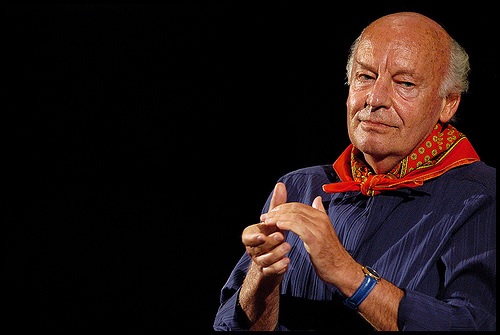The brilliant and beautiful Uruguayan writer Eduardo Galeano left us yesterday. Let others assemble the capsule biographies to mark his passing: there will be many such tributes. I can speak only personally about this loss. My loss.
Excerpts from a letter that I sent to him in 2000:
“Through Bob Carty I have finally tracked down your address, something I have been searching for, on and off, for many years. Your books are wandering about the lands and the minds of the world, having their own adventures that their author might never know—but these books send some of us back as messengers to recount their stories to you. Here are a few of them.
“Reading Memory of Fire after a former lover told me about you, reading it aloud to her in bed, in particular *Century of the Wind,” a long account that needed the invention of an entirely new genre, the synthesis of poetry and journalism, poetry with a bibliography. Later, days after we had woken up to the news that the Sandinistas had lost the election in Nicaragua, lying there paralyzed that morning, unable to speak, we read your essay, although what I most remember was the critique of the Soviet project in a few words—“orthopedic socialism.” [P]ulling the people along by the ear. But the image of the child lost in the storm has remained with me, a Canadian socialist and union leader who has no idea where to go next.
“Then, shortly after meeting my life partner more than five years ago, reading The Book of Embraces, I saw there a new level of being human that I could only dream of becoming, an amplified humanity refined by fire, balanced, wise and passionate. Marianne lived in the Yukon then, more than two thousand miles away. Your words needed to travel there….Later, when she moved to Ottawa, I read it to her…laughing one moment, crying the next.
“I gave my late mother a copy of the book, too. I had no idea what her reaction would be, but wanted her to know more about me and what my aspirations were. I thought your Left politics would put her off, no matter how humane, how informed by the best of human passion they were. I was wrong. She phoned me to ask me to buy more copies for her friends.
“And so, on behalf of your books, coming to me through the tinted glass of translation, I want to thank you.”
And he responded, thanking me in turn and wishing me a joyful New Year, and adding a little drawing as part of his signature.
Later, in 2009, he visited Ottawa to read from his new book, Mirrors. I was there with the woman who had first introduced me to him. I went up to the signing table, shook his hand. I looked into his warm eyes and wondered what it must be like to be so deeply alive. I told him I had written to him years before, and received a card from him. His eyes twinkled. “That was a good card, wasn’t it?” He signed my new book, and also my copy of The Book of Embraces: “To John, abrazos!”
I embrace his Magical Marxism — “one half reason, one half passion, a third half mystery.” He was a storyteller who melded harsh reality with unquenchable dreams of hope. He invented a new way of telling that never-ending story, in a style that was the very core of his vision.
There was talk a few months ago that he had repudiated his young polemic, Open Veins of Latin America. Read the silly NYT article at the link with a critical eye, and pay attention as always to his words — not those of his posturing opponents, or the vapid reporter. The fault he found in that book was the fault that all of us, growing older, see in the creations of our youth. Unrefined. Too raw. Too angry. Lacking the deeply human dimensions of his later work, that should inform any practical politics that dares to deem itself progressive.
And now he has no more words.
You left us too soon, compañero Eduardo. Hasta siempre.




